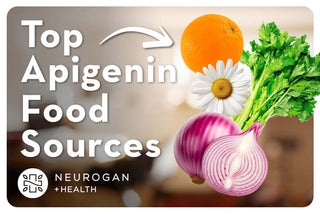The richest dietary sources of the natural flavonoid apigenin include parsley and celery hearts, with chamomile flowers having up to 840 mg per 100 g [1]. However, you're not likely to eat whole chamomile flowers, so you're getting much less if you drink it as a tea.
Fresh parsley can contain up to 215.5 mg of apigenin per 100 g, which looks like roughly two large bunches or about four cups of loosely packed leaves [2]. To consume this much daily, you’d need to include parsley in multiple dishes, such as salads, soups, and smoothies, to benefit from apigenin consistently.
For reference, an average serving of tabbouleh — a parsley-heavy salad — has around 50 grams of fresh parsley, meaning you’d need two servings to reach 100 g.
I'm not sure I love parsley enough to do this daily, so apigenin supplements offer a much more convenient alternative for consistent intake.
Apigenin-Rich Foods by Category
Eating a diet rich in apigenin is healthy as it also contains fibers, vitamins, and other minerals that support your well-being. Below is a categorized list of the top food sources of apigenin, including vegetables, fruits, flowers, and beverages that naturally contain this powerful compound [2].
Vegetables
-
Celery Hearts
-
Onions
-
Spinach
-
Raw Chilli Peppers
-
Artichokes
Fruits
-
Oranges
-
Grapefruit
-
Cherries
-
Apples (skin-on)
Flowers & Herbs
-
Fresh parsley
-
Chamomile (dried flowers)
-
Oregano
-
Basil
-
Foxglove
Beverages
-
Chamomile Tea
-
Celery Juice
-
Herbal Infusions
-
Beer
-
Red wine
Apigenin Content in Foods
Below is a simple table showing how much apigenin is in some everyday foods, making it easier to see which ones have the most.
|
Food Source |
Apigenin Content (mg per 100 g) |
|
Chamomile Flowers (Dried) |
840 mg |
|
Parsley (Fresh) |
215.5 mg |
|
Foxglove |
35 mg |
|
Kumquats |
21.87 mg |
|
Celery Hearts |
19.1 mg |
|
Artichokes |
7.48 mg |
|
Mint (Fresh) |
5.4 mg |
|
Thyme (Fresh) |
2.5 mg |
|
Oranges |
2-5 mg |
|
Grapefruit |
1-3 mg |
|
Apples (with skin) |
0.5-2 mg |
Chamomile: A Standout Apigenin Source
Chamomile flowers are one of the most concentrated natural sources of apigenin, with dried chamomile containing approximately 16.8% apigenin [1]. Chamomile tea retains a significant amount of this flavonoid, making it one of the most accessible ways to consume apigenin daily.
Many people drink chamomile tea for relaxation, but it also provides a natural way to incorporate more apigenin into a diet without needing to prepare specific meals.

Why the Source of Apigenin Matters
Dietary flavonoids like apigenin content can vary based on how foods are grown, processed, and consumed.
For instance:
-
Dried parsley is more concentrated than fresh due to water loss.
-
Chamomile tea provides apigenin in an easy-to-absorb form.
-
Fresh fruits like apples and oranges contain lower amounts but increase overall intake.
Eating a varied diet with a mix of vegetables, herbs, and teas can help you steadily intake natural apigenin alongside other antioxidant vitamins, minerals, and fiber.
Apigenin Supplements and Dosage
Apigenin supplements can be used to support heart and brain health, promote healthier skin, and more.

Apigenin supplements often contain higher nutrient doses than those consumed naturally through dietary sources. The recommended daily intake of apigenin is still up for debate, with varying recommendations from different studies — Typically, they range from 25-200 mg daily.
While apigenin is safe, you still have to be careful of higher doses as it may cause stomach discomfort, skin irritations, or other adverse reactions.
Apigenin in Foods
Apigenin is easy to come by in herbs like parsley and chamomile and vegetables like celery and spinach.
Adding a mix of these fruits and vegetables can help you maintain a well-balanced diet rich in nutrients, but they're not always the most dependable way to get high amounts of apigenin. Apigenin supplements are a concentrated way to ensure optimal intake for beneficial health effects like sleep support, antioxidant protection, and more. Just make sure you're purchasing your dietary supplements from reliable sources that can provide third-party lab testing on the purity and safety of the compound.
Resources:
-
Examine.com. (n.d.). Apigenin. Retrieved from https://examine.com/supplements/apigenin/ (n.d.). Flavonoids. Oregon State University. Retrieved from https://lpi.oregonstate.edu/mic/dietary-factors/phytochemicals/flavonoids*
-
Linus Pauling Institute. (n.d.). Flavonoids. Oregon State University. Retrieved from https://lpi.oregonstate.edu/mic/dietary-factors/phytochemicals/flavonoids




